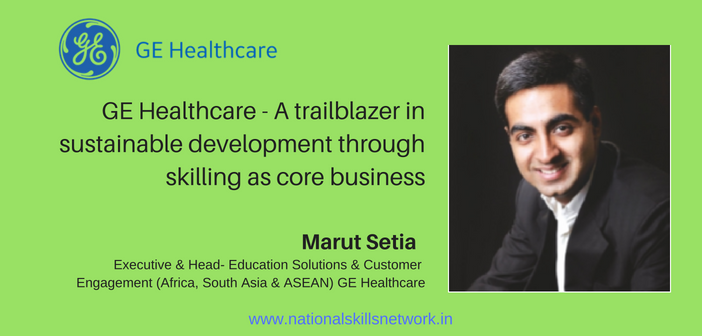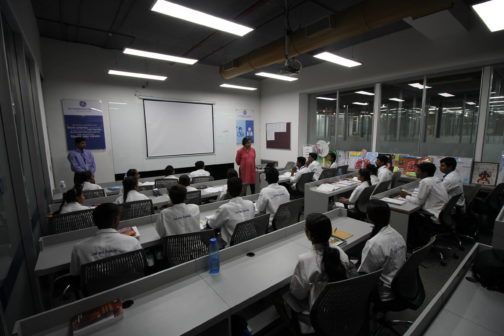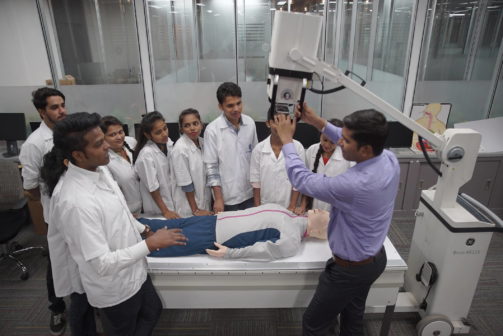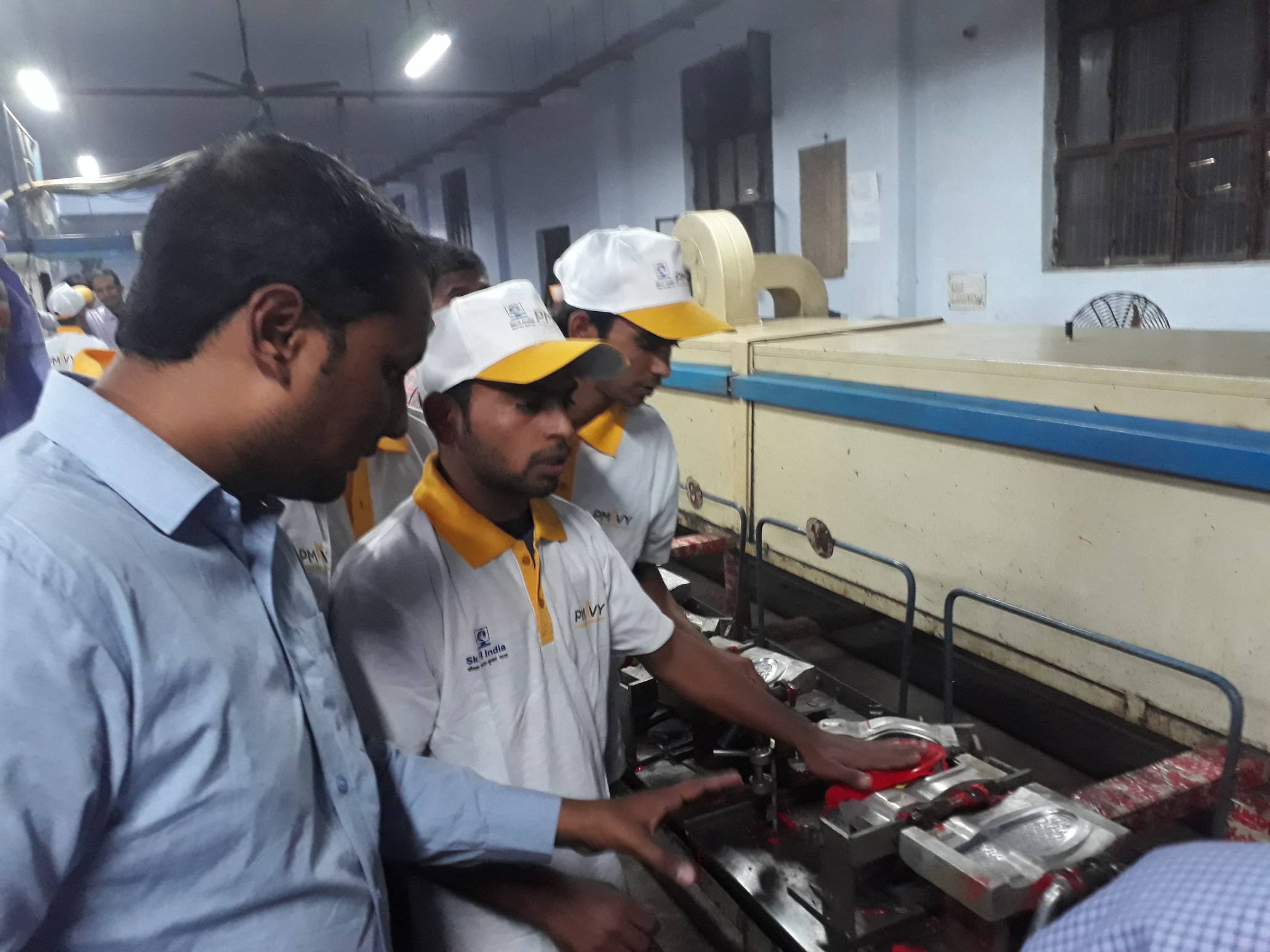Active participation from private sector is a proven way to drive sustained commitment and quality outcomes in skill development, at the global level. GE Healthcare Institute has been spearheading many industry-driven training programs in the Healthcare sector and recently, the GE-Tata Trusts skill project has been shortlisted for the prestigious Financial Times/ International Finance Corporation Transformational Business Awards 2018 under the category of Achievement in Sustainable Development: Education, Knowledge and Skills category. On this occasion, we caught up with Marut Setia, Executive & Head- Education Solutions & Customer Engagement (Africa, South Asia & ASEAN) GE Healthcare, to learn more about the priorities and plans for skilling in the Healthcare Sector. Let’s read on…
Q: GE is primarily, a technology company, could you throw some light on how and what factors led to the formation of GE Healthcare Institute?
A: You are right. GE has been known to be driving excellence through technology. However, our long presence in emerging markets makes us believe that investment in creating solutions around healthcare is extremely important to deliver the health outcome transformations that most emerging countries are looking for. Skill development and education is one such pillar that GE is committed to invest in for helping our customers deliver superior healthcare outcomes for their patients.

Q: Unlike many corporates for whom skilling is a part of CSR, for GE Healthcare, skilling is core business – can you tell us more about this positioning?
A: Skill development and education are a core part of GE’s strategy to support our customers. We believe that investment in such core capabilities should be a part of the business strategy, so we have aligned our efforts towards running this team like any other business unit in GE. While leveraging CSR money is a good opportunity, it does not lend itself to deliver the scale that we are looking for. Also, investing in education as a business makes us more accountable towards our customers and the company. We believe in the concept of frugal innovation and this business unit is a living example our firm belief.
Q: How is GE adding value to the skilling initiative and what are some of the features that make it unique?
 A: On the skill creation side, GE seeks to develop a cadre of health workforce with the right attitude, compassion and passion for quality of care. GE Healthcare Institute’s training programs have been designed on the basis of reports and evidence on shortfall in skilled professionals in the healthcare sector as well as dialogues with employees in the healthcare industry. On the other hand, we work with academic institutions and in-service medical personnel to help these aspiring and existing healthcare professionals contribute better to the health ecosystem as well as the community.
A: On the skill creation side, GE seeks to develop a cadre of health workforce with the right attitude, compassion and passion for quality of care. GE Healthcare Institute’s training programs have been designed on the basis of reports and evidence on shortfall in skilled professionals in the healthcare sector as well as dialogues with employees in the healthcare industry. On the other hand, we work with academic institutions and in-service medical personnel to help these aspiring and existing healthcare professionals contribute better to the health ecosystem as well as the community.
5 Pillars of GE’s sustainable model of skill development
What GE brings distinctively to the program is its corporate efficiency within a sustainable model of skill development. The entire model, led by the vision of creating quality trained professionals, is supported through five key pillars:
- Skilling – making young individuals employable
- Scalability – expanding the program across India
- Partnerships with Industry – securing placement opportunities
- Frugal, high impact model of skilling – sustaining through high return on investment through skill creation and impact on livelihoods
- Leadership investment – putting the best talent to solve this challenging problem
Q: Apart from milestones, it would be good to know about GE Healthcare partnerships and how you are leading in this sector.
A: We fundamentally believe that a problem (or opportunity) of this magnitude cannot be solved without borrowing the best that different players in the ecosystem have to offer. To this effect, we have partnered with multiple organizations across the value chain. These include:
- Reputed Indian and international organizations like IAE (Indian Association of Echocardiography), ACOG (American College of Obstetricians and Gynecology), etc.
- Delivery partners, such as IL&FS Skills and Edujobs, who believe in our vision
- Funding partners such as USAID, Tata Trusts, etc.
And this is only the beginning. We are committed to skill development in India and continue to work with multiple local and international players to deliver the best possible outcome.
Q: What is your advice to professionals in the healthcare space?
 A: For those who are already in the workforce, I would say, “you have a really important job, continue to be curious and don’t stop learning. A path of continuous skill development will enable you to be at the top of your chosen field and will help you accomplish your goals.”
A: For those who are already in the workforce, I would say, “you have a really important job, continue to be curious and don’t stop learning. A path of continuous skill development will enable you to be at the top of your chosen field and will help you accomplish your goals.”
For those who want to enter this field, my advice would be, “delivering healthcare to those who need it, is, probably the most respected job on this planet. Learn not only how to be a great professional but also to be a champion for your patients. Your empathy and integrity are the tools that you will use to create an equitable healthcare system that one day we all can be proud of.”
We need a policy-level push in skill enhancement. NSDC/HSSC are directionally taking the right steps that have supported the entry of players like GE. A lot more needs to be done and our interactions with the government officials make us confident that policies are being aligned towards this end. To give you an example, GE is working with Borno State government in Nigeria to impart skills to government healthcare professionals, thereby improving public health outcomes.
Q: GE is among few corporates who have invested in skilling initiative. Would you like to highlight the top three accomplishments?
A: Calling these accomplishments gives it a sense of finality. I don’t think we are even close to the end line. There are a few milestones that we have achieved in the skill development space:
- Scale up of the skill creation model from a single institute with 8 students in 2015 to 40+ locations across 17 states with 2000+ students in 2017 is probably something anyone will be proud of. We could not have done this without support from our partner Tata Trusts and our implementation partners.
- Our global and local partnerships which have helped us learn and scale faster is something I will recommend to anyone who wants to get into this space. There is limited value in reinventing the wheel and leveraging existing expertise really helps.
- The breadth of our skill upgradation programs which support professionals across the ecosystem from community healthcare workers to allied healthcare professions to GPs and super specialists has given us a very broad canvas to work with. We now have more than 80 short-term courses that we can leverage to develop solutions for a wide variety of needs of hospital systems across the country.
This is just the beginning and we truly feel that there is a long way for us to go and working with the right partners, I am sure we will get there soon.
Q: There is a huge need to reskill or upskill the existing resources — how does GE view this opportunity? What are some of the challenges in implementation that GE anticipates?
A: You are right, just creating new professionals or supporting academic institutes will deliver the desired impact only in years to come. To face the challenge head on, we need to support existing professionals and give them opportunities to be better at what they do. This will not only lend itself to a long-term impact on the development of healthcare sector but also solve immediate access problems where lack of skills inhibits access to quality healthcare for patients.
While this an incredible opportunity, it is extremely difficult to address given the geographical spread of the healthcare professionals across the country. Focusing only on tier 1 hospitals and/or tier 1 cities will only solve the problem of 20% of patients. Supporting the last mile healthcare worker needs investment and adoption of technology. GE is currently making significant investments in remote learning technologies, based on AR/VR etc. These investments will help us deliver the right content to the most hard-to-reach corners of the country and the world. The investment is long cycle and players in this space need to be invested for the long term. This is one of the areas where we feel GE will be able to add significant value in the future.













